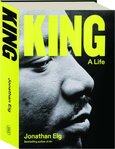


In celebration of Martin Luther King, Jr.’s 94th birthday this month, here are a few books that are in the spirit of his vision for a more diverse nation with equal rights for all, books that grapple with our history and ask us to think about our future.
The obvious first choice is Jonathan Eig’s brilliant new biography, King: A Life. It’s the first comprehensive biography in nearly three decades, and Eig is a superb writer and biographer. He’s the first to include newly released declassified FBI documents, and he’s created a compulsively readable and intimate story of a legendary figure.
For younger readers, there’s a brand new picture book called We Dream a World that honors the work of Dr. King and Coretta Scott King, written by their granddaughter, Yolanda Renee King (and illustrated by Nicole Tadgell). In the book, King addresses the many issues facing young people today—whether it's racial equality, gun violence, or climate change—and reassures readers that the next generation is strong and ready to lead and that they, too, can carry on the work of their elders and foster change.
But if you’ve read any of my columns and know me at all, you probably remember that I’ll almost always choose fiction over nonfiction, given the option. There are so many novels to choose from when thinking about how we can read to better understand our history of inequality and how we can move forward to a more just and equitable society. These are some recent favorites.
A gorgeous, haunting masterpiece, Let Us Descend is two-time National Book Award-winner and MacArthur fellow Jesmyn Ward’s fourth novel and a harrowing, raw depiction of slavery suffused with poetry. When the enslaved Annis is sold south—separated from her mother—she begins a hellish journey to New Orleans on which her companions include her memories, the stories she’s been told, and the spirit world. Ward’s language, her appreciation for the natural and the spirit worlds, and moments of joy and tenderness are something to marvel at.
Did you know Sarah Jessica Parker has her own imprint now? The second book she published was Coleman Hill by Kim Coleman Foote, published in September. Parker had this to say about it, “Kim Coleman Foote has the rare talent of completely immersing you in time and place . . . A sweeping yet intimate family saga.” Drawing from her own family history, Foote brings to life three generations of two families living intertwined lives. In 1916, two women leave the South to settle in New Jersey and, following the deaths of their husbands, raise their families together. Through multiple points of view from various characters, we see how they each attempt to shrug out of the past and into themselves.
For readers who prefer their settings to be more contemporary, Warrior Girl Unearthed by Angeline Boulley opened my eyes to so many things, most notably the reprehensible practices keeping indigenous people from properly honoring the remains of their ancestors. There’s also a murder investigation and a heist worked into a realistic coming-of-age story for the teen protagonist, all of which keep the pages turning long into these cold nights. Warrior Girl Unearthed is also a satisfying follow-up to Firekeeper’s Daughter, another favorite from a few years ago, that first introduced some of these characters (but is not required reading to appreciate the newer title). I highly recommend the pairing.
Chain-Gang All-Stars by Nana Kwame Adjei-Brenyah has a lot in common with Let Us Descend by Jesmyn Ward, despite being set centuries in the future—a disturbing, dystopian near-future in which incarcerated people can fight to the death in order to earn their freedom. Both books depict desperate plights, but it’s the language. The language will blow you away. Both have love stories that will break your heart, shake you up, and give you hope. Unlike Ward’s, Adjei-Brenyah’s is a satire about our very American prison-industrial complex, and I love that Adjei-Brenyah wears his heart and his politics on his sleeve.
Not all of these stories are easy to read, but they’re important. To bear witness, to listen, to learn—sometimes this is exactly what reading is for.